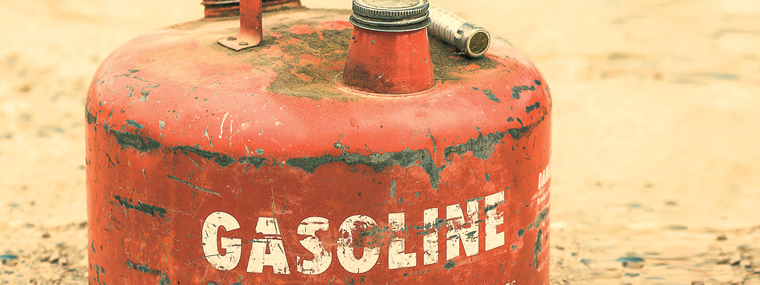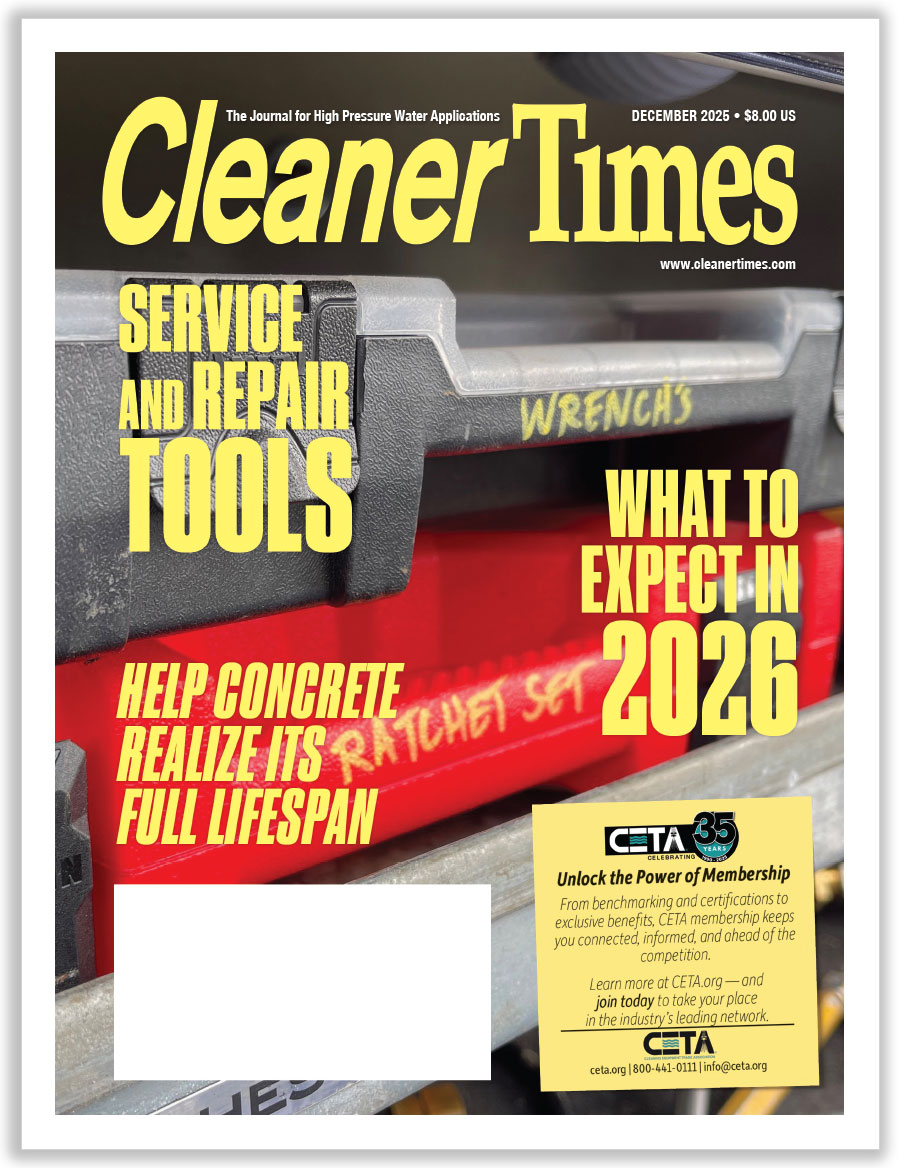
Protect Your Engine: Stay Away from Bad Fuel
By Carissa Gingriss / Published October 2015

What Is The Problem?
For pressure washer operators, there is nothing more frustrating than equipment that re-
fuses to fire up for the first deep clean of spring. Issues with hard starting small engines frequently stem from improper storage at the end of the previous season. But, this year as you begin to pack away summer outdoor power equipment, in favor of winter gear, proper storage should be top of mind to ensure an easy start next season.
Protect The Engine
The engine of a pressure washer is one of the most important components to protect. Maintaining the engine on a gasoline-powered pressure washer will help it run efficiently and last longer. Without ensuring the engine is prepped for storage properly, you can expect costly repairs. First and foremost: use an effective fuel treatment at every fill up. Fuel treatment should be used both for preventative maintenance against ethanol-blended fuel, as well as storage to prevent fuel from going bad.
So what is “bad” fuel? Stale gasoline that has oxidized.
Gasoline can begin to degrade, and fuel oxidization can occur 30 days after it is pumped. Over time, fuel molecules will become less stable and oxidize. As fuel oxidizes it can turn to gum and clog jets and other openings in the fuel system, leading to non-starting or poor running conditions. Gummed up carburetors cause serious problems in power equipment that sees intermittent use or long periods of storage, such as pressure washers.
Ethanol-Blended Fuel
About 90-percent of the fuel sold in the United States contains ethanol, usually designated as E10. Ethanol-blended fuel is a corrosive substance and can cause the gradual destruction of the metal used in the fuel systems of outdoor power equipment. Corrosion in the fuel system can come from two areas—water and the fuel itself. Ethanol-blended fuel is especially corrosive to soft metals found in fuel systems such as brass and aluminum. Ethanol also absorbs water, drawing it into the fuel mixture. Water is highly corrosive to a fuel system and, when ethanol and water combine, it can cause performance problems and fuel system damage.
Engine Experts
As the world’s leading manufacturer of gasoline-powered engines for outdoor power equipment, Briggs & Stratton understands what it takes to maintain “good engine health.” In order to ensure our engines continue to start easily and last long, Briggs & Stratton constantly focuses on educating outdoor power equipment operators on the importance of maintenance, especially in the areas of fuel treatment and ethanol-related problems.
The problem with fuel treatment today is the lack of industry standards or regulation specific to outdoor power equipment. Anyone can bottle any type of chemicals, claim that it treats fuel, and sell it to consumers. With so many fabricated fuel treatments on the market today, it can be confusing to know which products are truly effective. And what many outdoor power equipment owners don’t know is that, in many cases, engine damage related to bad fuel voids the warranty of the engine.
Properties Of An Effective Fuel Treatment
An effective fuel treatment will combat the two main causes of engine damage that occur when using today’s fuel: oxidation and corrosion. A basic fuel treatment will address both of these problems with effective antioxidants and corrosion inhibitors.
Antioxidant
Antioxidants help promote stability, preventing the “clumping” that causes gummed fuel and can result in clogged jets. Briggs & Stratton Advanced For-mula Fuel Treatment is formulated with the most powerful blend of triple antioxidants and provides up to three years of fuel stability.
Corrosion Inhibitor
Equipment owners also want to look for fuel treatments that feature a corrosion inhibitor to block corrosion that can occur when moisture comes into contact with the metal parts in an engine. Briggs & Stratton Advanced Formula Fuel Treatment contains high-performance corrosion inhibitors to protect the soft metals commonly found in most fuel systems.
Other Things To Consider:
• Detergent—One additional component of an effective fuel treatment is a fuel system cleaner, or detergent, to help clean fuel lines, carburetor jets, needles, and even intake valves. Briggs & Stratton Advanced Formula Fuel Treatment contains advanced detergents to maintain fuel system health.
• Alcohol—Here’s one thing equipment owners don’t want in the fuel treatment they use: added alcohol. With many ethanol-blended fuels containing up to 10 percent ethanol, the last thing an equipment owner would want is to add more alcohol to the fuel. And owners need to be particularly cautious when reading fuel treatment labels: Alcohol, or oxygen-containing solvents, can be listed under many names, including ethanol, glycol ether, or isopropyl alcohol. Briggs & Stratton Advanced Formula Fuel Treatment contains no alcohol.
• Other Storage Prep—While adding fuel treatment every time you fill up can prepare your engine for storage, you’ll also want to address several other components of the pressure washer.
• Flush Out the System—When putting your pressure washer in storage, it is important that no water remains in the pump. Residual water tends to expand rapidly under low temperatures and can crack components like detergent lines and hoses.
• Maintain the Pump System—Once you have removed all liquids from the pressure washer pump system, you’ll want to fill your pressure washer with pump saver. In addition to lubricating seals and pistons to keep them from drying out and protecting against freezing, the solution helps prevent rust and damage from mineral deposits.
• Where to Store Your Pressure Washer—Store the pressure washer in a clean, cool, and dry area, protected from freezing temperatures or other weather elements. Keep it away from heat sources that could dry out the pump seals or ignite fuel vapors.
Preparing your pressure washer for storage is a must if you want to prolong the lifespan of the equipment. Any kind of fluid such as untreated gas or water left inside equipment can jam up the components and cause devastating problems later on. Your manual will have more specific details on maintenance procedures, but by following these general maintenance steps you will ensure an easy start of your pressure washer for the next use, and have no trouble accomplishing your next cleaning project!
Carissa Gingras is Director of Marketing for the Consumer Engine & Service Division of Briggs & Stratton Corporation. For more information, visit www.BriggsandStratton.com.




